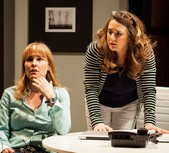SITE GUIDE
SEARCH
REVIEWS
REVIEW ARCHIVES
ADVERTISING AT CURTAINUP
FEATURES
NEWS
Etcetera and
Short Term Listings
LISTINGS
Broadway
Off-Broadway
NYC Restaurants
BOOKS and CDs
OTHER PLACES
Berkshires
London
California
New Jersey
DC
Philadelphia
Elsewhere
QUOTES
TKTS
PLAYWRIGHTS' ALBUMS
LETTERS TO EDITOR
FILM
LINKS
MISCELLANEOUS
Free Updates
Masthead
A CurtainUp Review
Good Television
| "
I can't believe what good shape he's in for a tweaker. No scabs. All his teeth. I guess he hasn't been using enough?"
|

Kelly McAndrew and Talia Balsam
Photo: Kevin Thomas Garcia |
In Good Television, the show at its center is called Rehabilitation. It doesn't take a reality TV watcher (read: me) very long to note the parallels to the constantly watched A&E show Intervention. An addict is followed around by a supposed documentary camera crew while they go about their addict ways. And then, friends and family stage an intervention, with the show offering access to an excellent rehab facility.
We quickly find out that Rehabilitation is doing so well they need to double their output, which also means doubling their number of subjects. We meet the showrunner, Bernice (a snide Talia Balsam), the senior producer and licensed therapist Connie (an impassioned Kelly McAndrew), and the newest team member, a young and familial-y connected Tara (a grounded Jessica Cummings) who acts as the moral center for this story.
The addict whose story and rehab is up for grabs is Clemson, a young crystal meth addict. John Magaro plays Clemson with googly eyes and flaccid muscles, convincingly trailing his sentences off into the ether. The trick here, though, is what goes into crafting this reality TV show — making it the best TV possible— making it “good television.” Thus far for Rehabilitation this has meant finding a compelling addict who is the most likely to accept rehab, and stay sober. As the production team evaluates Clemson and his family, their reasons for ultimately choosing him seem half-baked, but inevitable for storytelling purposes. And of course when the team heads down to South Carolina for filming (with a new showrunner now cutting his teeth as a cameraman), the crap hits the fan. Will this be good television? Is it moral to expose this family, and is the show itself morally good?
Rob MacLachlan's script is compelling, fast and humorous. But at times motives and decisions are opaque, and MacLchlan doesn't venture all the way into the depths of reality's morality (and for what its worth, this production team may be very LA, but their immoral tendencies are slight). Instead, the focus seems to veer towards the female characters and their struggles (including Clemson's heart-wrenching sister), and their survival. Perhaps this is more than one play's worth of ideas set forth. Television is a large target, but one's aim still needs to be true.
|
Good Television Written by Rod McLachlan Directed by Bob Krakower Cast (in order of appearance): John Magaro, Jessica Cummings, Talia Balsam, Kelly McAndrew, Zoe Perry, Andrew Stewart-Jones, Luke Robertson, Ned Van Zandt Sets: Eric Southern Costumes: Theresa Squire Sound and Original Music: Cormac Bluestone Lighting: Mary Louise Geiger Violence Consultant: J David Brimmer Production Stage Manager: Katrina Hermann Assistant Stage Manager: Rebecca Spinac Atlantic Theater, Stage 2, 330 West 16th Street, atlantictheater.org 866-811-4111 From May 22 – June 21, 2013; opening June 4, 2013 Tuesday - Saturdays @ 730pm, Saturdays and Sundays at 230pm Reviewed by Amanda Cooper based on 5/31/13 performance |
| REVIEW FEEDBACK Highlight one of the responses below and click "copy" or"CTRL+C"
Paste the highlighted text into the subject line (CTRL+ V): Feel free to add detailed comments in the body of the email. . .also the names and emails of any friends to whom you'd like us to forward a copy of this review. Visit Curtainup's Blog Annex For a feed to reviews and features as they are posted add http://curtainupnewlinks.blogspot.com to your reader Curtainup at Facebook . . . Curtainup at Twitter Subscribe to our FREE email updates: E-mail: esommer@curtainup.comesommer@curtainup.com put SUBSCRIBE CURTAINUP EMAIL UPDATE in the subject line and your full name and email address in the body of the message. If you can spare a minute, tell us how you came to CurtainUp and from what part of the country. |



 Anything Goes Cast Recording
Anything Goes Cast Recording Book of Mormon -CD
Book of Mormon -CD